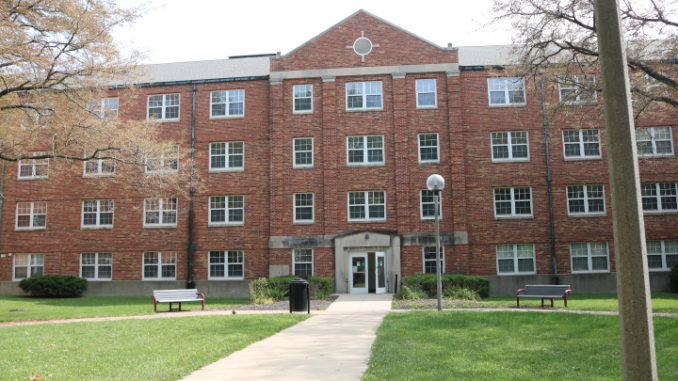
Students looking to return to campus housing next fall will find changes to the housing options. To retain more upper-class students, Residence Life is making key modifications to the residence halls.
The changes stem from a new approach to building student communities, said Jamie Van Boxel, Director of Residence Life.
“We have shifted our philosophy from having a few students in every building on campus to filling the building with students and giving them the opportunity to meet a diverse group of students,” Van Boxel said.
Dobson tends to be the hall that students are manually assigned to when filling the building instead of being a hall of choice during the self-selection period, Van Boxel said.
“The primary goal is about attracting current on-campus students to stay,” Van Boxel said of the changes being implemented.
National data shows that students who live on campus for up to two years graduate at a higher rate than those who don’t, said Van Boxel.
The Residence Life satisfaction survey revealed that students from marginalized populations, such as students in the LGBTQIA community, rate campus living higher than other students because of the sense of community, safety and openness that comes with living in a Truman community with fellow Bulldogs, Van Boxel said.
On-campus living is a popular option for seniors who only have one semester remaining or students planning on studying abroad and only need one semester of housing, Van Boxel said. On-campus living is also popular with international students who often move to the United States without prior connections.
Rocío Fuertes Navarro, an international student from Spain, is studying for her Master of Arts in Education with a focus on elementary education and is living in the Campbell Apartments.
“When you travel so far from your country, it is nice to get to know American people here,” Fuertes said of living on-campus. “I would absolutely recommend international students to live in the dorms to get to know other people and get used to life here.”
On-campus living is also convenient for students who do not want to think about managing a relationship with a landlord, and there are options available for roommate pairings that do not work out, Van Boxel said.
For many off-campus housing options, leases for 12 months, including the time during winter and summer breaks. There is also not much that can be done in cases of a frayed relationship with a roommate.
But the way on-campus housing works, you pay as you go, Van Boxel said.
“If you want to be here over summer break or winter break, then you pay for that, but if you’re not here, then you won’t pay for that,” Van Boxel said.
One of the services Residence Life offers that comes as a part of the rate students pay that gets forgotten is the roommate selection and evaluation of pairings, Van Boxel said.
The roommate selection software on the housing portal allows students to give information about themselves that will be used to rate pairings with potential roommates. There is also the option to look at other students’ profiles, social media handles and message potential roommates during the self-selection process.
“But for students who don’t want to go through the self-selection process, all of the tools and information are still used to manually pair students together as roommates,” Van Boxel said.
Random people aren’t matched together – the software tools are used to match people based on how well they may align in terms of living together, Van Boxel said.
Students who earn Truman-based scholarships can receive money that can only be applied to on-campus living, which is another factor for students to consider. However, there are many reasons students would choose the convenience of living on-campus instead of off-campus housing.
Student surveys reveal that they don’t want to manage all of the individual expenses of living off-campus, Van Boxel said.
“I am living in Campbell this semester, and I like it very much,” Fuertes said. “Since I don’t have a car, it is very nice to live close to classes and the dining halls.”
The goal is not to compete with off-campus living but to provide an all-inclusive, healthy, safe and convenient alternative, Van Boxel said.
“I am hopeful that we will have a higher percentage of current students who choose to live on campus for an additional year,” Van Boxel said. “Having less buildings open has an impact on the number of SAs we can potentially hire.”
Every time the on-campus population increases by 40 students, another student advisor is hired, Van Boxel said.
“We have a strategic plan, which is to focus on student experience,” Van Boxel said.
Among the changes students can expect:
- Dobson Hall will be closing.
- Pet-housing will be moving to Blanton-Nason-Brewer.
- Single apartments in the Campbell Apartments will be offered for the first time.
- Triple rooms in BNB will be converted into deluxe double rooms at a reduced price for returning students.
- The fourth floor of West Campus Suites will be reopening.
